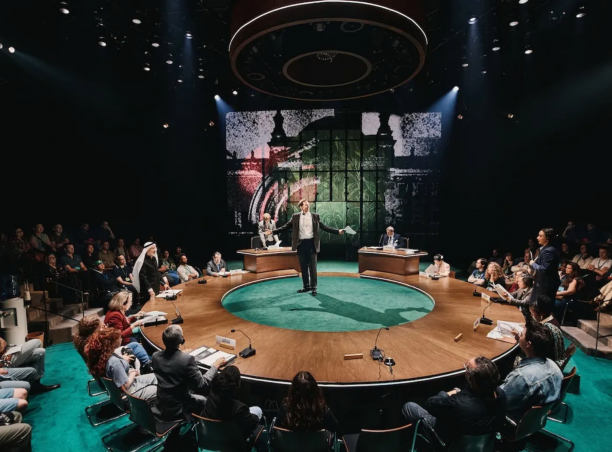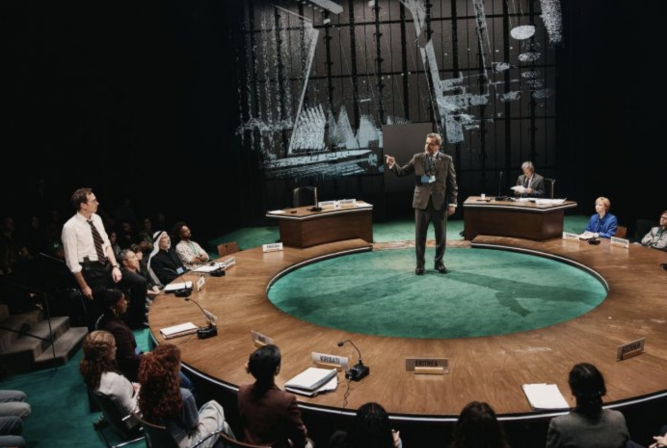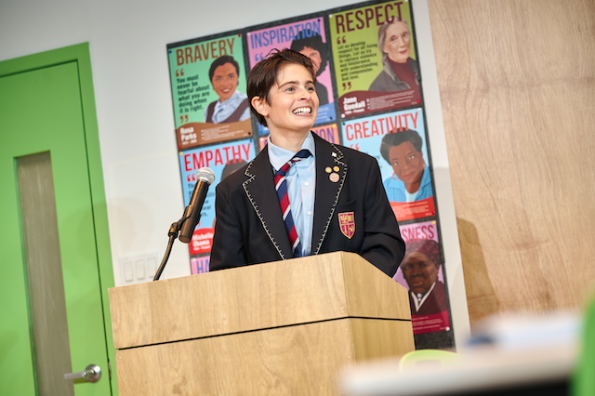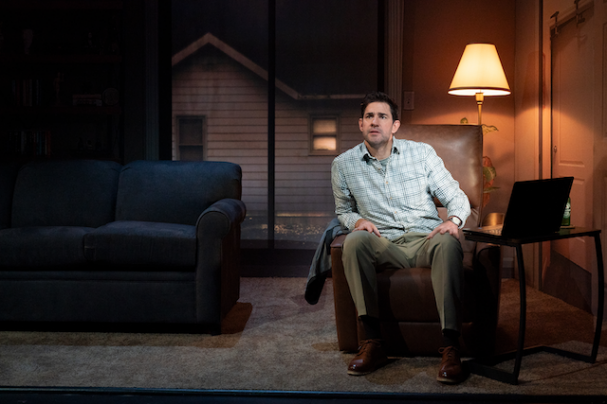
Stephen Kunken and the Ensemble. (Photo: Emilio Madrid)
Kyoto
By Julia Polinsky
If the words “climate-change thriller” make you wonder if you’ve heard wrong, you haven’t. Kyoto, now at the Mitzi E. Newhouse in a stylish, nearly-immersive production that makes great use of their almost-theater-in-the-round stage, is indeed thrilling—at times. Even if just thinking about climate change makes you want to nap, you likely won’t. That’s partly because of the electrifying (if you’ll excuse the climate-related pun) performances, partly the sharp dialogue, partly the very neat trick of making this piece of recent history into compelling drama.
A British import, Kyoto premiered at the Royal Shakespeare Theatre in Stratford in 2024, then had a West End run in 2025. Under the direction of the multi-award winning Stephen Daldry and Justin Martin (who also co-directed Stranger Things: The First Shadow), the excellent cast at Lincoln Center Theater whips out their talk, talk, talk and engages the audience, sometimes quite directly. The actors move over, around, and off/on Miriam Buether’s terrific scenic design, which turns the stage at the Newhouse into a giant conference table. Some audience members are seated at it, and they neatly become part of the show; many audience members are given “delegate” badges, which turns them into “participants” in these negotiations.
It’s hard to remember there was a time when the phrase “climate change” wasn’t part of our daily language. Authors Joe Murphy and Joe Robertson start Kyoto by taking us back to those days, with an introductory speech from Washington lawyer/Reagan-era bureaucrat Don Pearlman (Stephen Kunken). Addressing the audience directly, Pearlman speaks of what a mess life is now and how “glorious” the 90s were – to groans from the audience. He is the most charming villain in ages, completely transparent about his support for Big Oil and the Seven Sisters (the mega-companies that dominate the petroleum industry) who hire him to, essentially, derail the UN climate change talks. (Spoiler: he succeeds, for years.)

Stephen Kunken, Jorge Bosch,and the cast of Kyoto. (Photo: Emilio Madrid)
The quintessential political fixer, Pearlman neatly sabotages the climate change committee. He does a great job of subverting committee members, and making sure other people don’t listen, or can’t, or won’t. He also makes damn sure that nobody hears the uncomfortable truth: that the oil companies knew all the way back in 1959 that careless, widespread burning of fossil fuels would likely create the host of horrors we live with on a daily basis, particularly global warming and its sidekicks (melting polar ice caps, rising sea level, coastal flooding). Kyoto makes clear that they knew, and kept that knowledge secret, as long as they could.
The show itself is not only about climate change, but also about language: the language we use to connect, to confuse, to clarify. In Act 2, there’s a hilarious and horrifying scene in which the ensemble argues about punctuation, and a related one that happens after the UN translator leaves, and people misunderstand each other. That misunderstanding plays out in Pearlman’s personal life, too; he cannot or will not talk to his wife Shirley (Natalie Gold) or teenage son on this newfangled cellular phone (there’s a nice bit of business about that phone once Pearlman finally talks to his son).

Taiana Tully, Stephen Kunken, Kate Burton, Peter Bradbury, Feodor Chin (Photo: Emilio Madrid)
Video projections from Akhila Krishnan blend historical news footage and scads of information. Natalie Pryce’s costumes are spot-on, ditto lighting from Aideen Malone. But it’s the performances that make Kyoto work, even as the Act 2 descends into confusion. The ensemble features standout performances from Jorge Bosch as committee chairman Raúl Estrada-Oyuela, who got stuck with the job because nobody else would take it, and ends up saving the day; Kate Burton as a no-bullshit American delegate who has no qualms about walking if she can’t get what the US wants; Feodor Chin as China’s delegate, Erin Darke as Angela Merkel, and Taiana Tully as the delegate from Kiribati (where?), a mouse that roars loud enough to make a difference.
Or almost make a difference. When Big Oil is stacked against the world, the world is likely to lose.
At the Mitzi E. Newhouse Theater
150 W. 65th St.
Running time: 2 hours 40 minutes, one intermission
Through November 30, 2025




